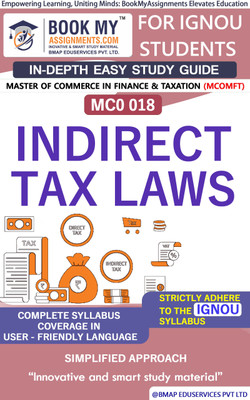IGNOU MCO 018 Indirect Tax Laws - (Section A - Central Excise; Section B - Service Tax & VAT; Section C ŌĆō Customs) In Depth Guide For Ignou Student(Paperback, BMA Publication)
Quick Overview
Product Price Comparison
IGNOU's MCO 018 course on Indirect Tax Laws involves understanding the legal framework, principles, and provisions governing indirect taxation in India. Here's an in-depth guide to help you effectively study for this course:Section A: Central ExciseIntroduction to Central Excise:Define central excise duty and understand its significance in the taxation of manufactured goods.Study the historical development and evolution of central excise laws in India.Levy and Collection of Central Excise Duty:Learn about the levy and collection mechanisms of central excise duty, including the concept of manufacture, taxable event, and excisable goods.Understand the valuation principles and procedures for determining the assessable value of excisable goods.Classification and Tariff:Study the classification of goods under the Central Excise Tariff Act and the Harmonized System of Nomenclature (HSN).Understand the structure of the excise tariff, including tariff headings, sub-headings, and rates of duty.Registration and Compliance:Learn about the registration requirements for excise manufacturers, dealers, and exporters.Understand the compliance procedures, including filing of excise returns, payment of duty, and maintenance of records.CENVAT Credit:Understand the concept of CENVAT (Central Value Added Tax) credit and its significance in allowing the set-off of excise duty paid on inputs, capital goods, and input services.Study the conditions and restrictions for availing and utilizing CENVAT credit.


